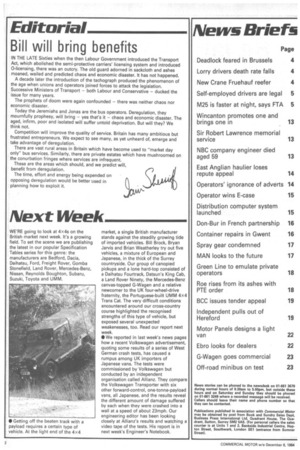Bill will bring benefits
Page 4

If you've noticed an error in this article please click here to report it so we can fix it.
IN THE LATE Sixties when the then Labour Government introduced the Transport Act, which abolished the semi-protective carriers' licensing system and introduced 0-licensing, there was an outcry. The old guard adorned in sackcloth and ashes moaned, wailed and predicted chaos and economic disaster. It has not happened.
A decade later the introduction of the tachograph produced the phenomenon of the age when unions and operators joined forces to attack the legislation. Successive Ministers of Transport — both Labour and Conservative — ducked the issue for many years.
The prophets of doom were again confounded — there was neither chaos nor economic disaster.
Today the Jeremiahs and Jonas are the bus operators. Deregulation, they mournfully prophesy, will bring — yes that's it — chaos and economic disaster. The aged, infirm, poor and isolated will suffer untold deprivation. But will they? We think not.
Competition will improve the quality of service. Britain has many ambitious but frustrated entrepreneurs. We expect to see many, as yet unheard of, emerge and take advantage of deregulation.
There are vast rural areas in Britain which have become used to "market day only" bus services. Similarly, there are private estates which have mushroomed on the conurbation fringes where services are infrequent.
These are the areas which should, and we predict will, benefit from deregulation.
The time, effort and energy being expended on opposing deregulation would be better used in planning how to exploit it.




























































































